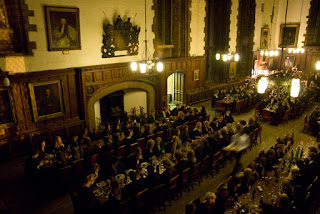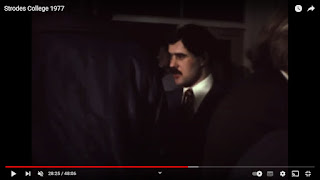“I don’t wanna go,” I was shouting as I struggled to hang on to the car door for dear life. I was being kidnapped and forced into a vehicle outside my home that was wanting to carry me away … to my first day at infant school. My mother was trying her gentlest to push inside the family car her five-year-old son who was usually well behaved and never angry or upset. Passers-by on their way to work in town were gazing. Passengers were pointedly staring out of a passing double-decker bus. What was wrong with that belligerent child? My mother was equally horrified to witness my first tantrum.
I enjoyed being at home. I had plenty of activities to occupy myself there. I never found myself at a loose end. My parents had a remarkably hands-off attitude to my upbringing, letting me put on records, listen to the radio, watch television or play in the back garden whenever I wanted. There was no regime to follow. I was perfectly content organising my own life and did not require a school to instruct me what I should do and when. During the past year, my mother had been sending me to Mrs Potten’s ‘Gay Tree’ nursery school on Grand Avenue in order to mix with other children because I was an only child. I had found most of my peers there to be noisy and bossy, whereas I was quiet and calm. To seek acceptance, I must have adopted their rather posh accents, committed to immortality when my father recorded me on his Uher reel-to-reel tape machine reciting the two ‘Winnie-the-Pooh’ books that I knew by heart.
My mother already harboured an aspiration for me to marry ‘above my station’. Whenever we walked into the town centre, on passing Bath Road, she would suggest I call on ‘Wooty’ who lived at the far end of that cul-de-sac in a large house backing onto the grounds of Sandhurst Royal Military Academy. I had met Alexandra Wooten at nursery school but had not developed a particularly close friendship with her, preferring the company of more down-to-earth Liam who lived only four doors away from our home … until his Irish parents moved away to Blackwater. Despite my mother’s persistence, I may have only visited Alexandra’s house once to ‘play’ because, unsurprisingly, I found we had no common interests.
My reluctance to attend primary school was due to anticipation that a new set of peers would be similar to Mrs Potten’s charges, the only children of my age I had so far encountered. I was mistaken! My fee-paying, town centre nursery school had been dominated by the offspring of Camberley’s middle class, whereas my state primary school was located on the peripheral council estate where I had been born, built to rehouse South Londoners whose homes had been destroyed by bombing during the War and subsequent slum clearance. Patronisingly, the council had named the estate’s streets ‘Kingston Road’, ‘Mitcham Road’, ‘Surbiton Road’, ‘Wimbledon Road’ and ‘Carshalton Road’, as if newcomers would feel more at home by eulogising their former hometowns some twenty miles away. Naturally, none of those roads led to the places after which they had been named.
I quickly discovered how wrong my expectations about school had been. My new classmates seemed perfectly normal. Unlike Mrs Potten, teachers did not require us to dress up in costumes and repeat archaic speeches for Biblical reenactments, or to watch violent ‘Punch & Judy’ puppet shows. Instead, we were given interesting creative activities to do and treated with respect and encouragement. Teachers addressed us by our first names. I loved school. I quickly retired my quasi-posh accent. I had already mastered the reading and writing skills with which some of my peers were struggling and was now teaching myself to type. One day at home, my mother had asked me to put away her electric iron and, without realising it was still plugged in, I picked it up by its plate and screamed, burning my right hand. She had to bandage my thumb and index finger for a while, so I continued to learn to type at home using my middle finger … the way I type to this day. I had wondered if my erased fingerprints would ever return, but they did eventually.
After two years, we all moved to the adjoining primary school where teaching was more structured. I attended my first morning assembly in the main hall but was baffled when the principal instructed us to recite something called the ‘Lord’s Prayer’. Everyone around me bowed their heads and recited a kind of mantra I had never heard. It felt unnervingly as if I had mistakenly been invited into some kind of cult in which all the teachers and children had already been indoctrinated … except me. I had no understanding of what was going on around me, more so because next we were told to sing strange songs from a thick book of incomprehensible ancient lyrics I had never heard played on the radio. It was impossible to sing when you had no idea what the tune should be.
Afterwards, having observed my bafflement, a teacher asked why I had not participated in the religious part of our school assembly. She seemed shocked that I had never heard of ‘hymns’ or ‘prayers’, asking whether my family was ‘Christian’. I had no idea what that word meant, so I returned home and asked my mother, who replied that we were not religious. She wrote a brief note to my teacher explaining that simple fact and, thereafter, I was excused from the section of daily assembly devoted to hymns and the like. Every day for the next four years, I would sit in a nearby small side-room alongside several children including classmate Jacqueline Dixon, a Hindu who initially asked me what was my religion. I had to tell her and the other non-Christians sequestered there that I did not seem to have one. I was an oddity.
Although my aunt Sheila worked as a ‘dinner lady’ at the school, I always returned home to take lunch. I would stand alone at the bus stop at the top end of Upper College Road, staring across at the modernist St Martin’s church on the opposite side of the roundabout, puzzled as to what might go on inside. I had heard classmates talk about attending something called ‘Sunday School’ there, next door to the home of classmate Annette van Hartaan Veldt. This church must have been where almost everyone else at school had been indoctrinated into their cult. It seemed to take an age until Aldershot & District Traction Company Limited’s number 1, 2 or 3C bus arrived to carry me one mile home for a halfpenny fare. (Once I had grown to be amongst the tallest in my class, the bus conductor insisted I pay the adult one penny fare despite me still being a child.) Arrived home, I would have just enough time to snack something and then catch the bus back for afternoon classes.
After school finished at four, if it was not raining, I could save the bus fare by walking home alone the length of Upper College Ride. This downhill route passed through a 400-yard stretch of Ministry of Defence woodland, a natural barrier intended to isolate the council estate from private housing around the town centre. It was always a lonely journey bereft of fellow pedestrians and scary on dark winter afternoons, me worrying an escapee from Broadmoor might jump out from behind a tree. The money saved I would blow in the sweet shop near my school on ‘Batman’ bubble gum packets, ‘Flying Saucers’, ‘Swizzels Love Hearts’, ‘Lemon Sherberts’ or a ‘Lucky Bag’. I was obsessed with the ‘Batman’ TV show and, as well as requesting my mother fabricate the superhero’s ‘utility belt’ for me to wear, I saved enough sweet wrappers to send for a ‘Batman’ poster that would grace my bedroom wall.
My favourite school activities were summer days when the teacher would take our class outside, thirty of us sat cross-legged in the shade of a huge tree behind the main building, writing essays in exercise books balanced on our laps. Those remain some of the happiest days of my life, before homework and exams impinged on my childhood, and before my parents sent me to a faraway school stuffed with posh boys and requiring a bottle-green uniform.
My least favourite school activity was ‘swimming’ in the newly constructed, unheated rectangular above-ground pool on the playing field. Alongside were two tiny windowless wooden huts in which girls and boys were shepherded separately to change into their costumes, and where I hated my mates spying me naked. I was so rake-thin that the bottom of my rib cage protruded, making me imagine I had some kind of physical deformity not evident in my schoolmates. My acute embarrassment destroyed any enjoyment and inhibited my capacity to learn to swim … which sadly I never overcame.
In my final year at Cordwalles, teacher Mr Hales encouraged us to open savings accounts with Trustee Savings Bank [TSB]. Once a week after class registration, he would ask if we had coins to deposit, record their value in our individual bank books and update our balances. It was a great way to make us understand the value of money, particularly as the monetary system was about to convert to ‘new pence’ from shillings. Would a school today actively encourage ten-year-olds to manage their first bank accounts in class?
I made some really good friends – including Paul Rowell, Michael Heinrich and Martin Bell – who would invite me to their houses on the estate after school. I was surrounded by peers of both sexes, of various religions and diverse races. I feel very lucky to have been educated in such a safe, sympathetic and uncompetitive environment, full of stimulation and encouragement that immensely shaped my attitudes and life thereafter. Unfortunately, it made my subsequent education and career make me feel all the more like a fish out of water, forced to navigate pathways amongst privileged, entitled people who seemed to have had very different childhoods that had fostered their cold, cutthroat, self-centred outlook on life.
I was sad to leave my primary school in 1969, after which I no longer saw the classmates with whom I had spent the previous six years. My parents failed to appreciate that their decision to continue my education at a distant school tore me away from roots I had forged on Old Dean Estate and isolated my social life by forcing me to travel daily to the other end of the county. At Cordwalles, I had felt like a normal boy living a normal life. I was never again made to feel that I fitted in so comfortably.
Postscript. The first time I went to church was in 1967 to accompany my mother to the final service of St George’s, built by the local Middleton family in the 1890’s on St George’s Road at Knoll Road, prior to its demolition to create a car park adjacent to Herman Solomon’s Garage. Despite never having known my mother attend any church, she was annoyed that our nearest one had been sold off as part of Camberley town centre’s modernisation.
More than two decades later, having recalled that I had once opened a savings account at school, I walked into the TSB Camberley branch in London Road and asked if I could withdraw the balance. It took several weeks for the staff to locate my details and obligingly add years of interest to my balance before I could withdraw a small sum that I had almost forgotten I had.
Virtual Tour of Cordwalles Classrooms
[Originally published at https://peoplelikeyoudontworkinradio.blogspot.com/2023/12/remember-days-of-old-schoolyard-1963.html]









